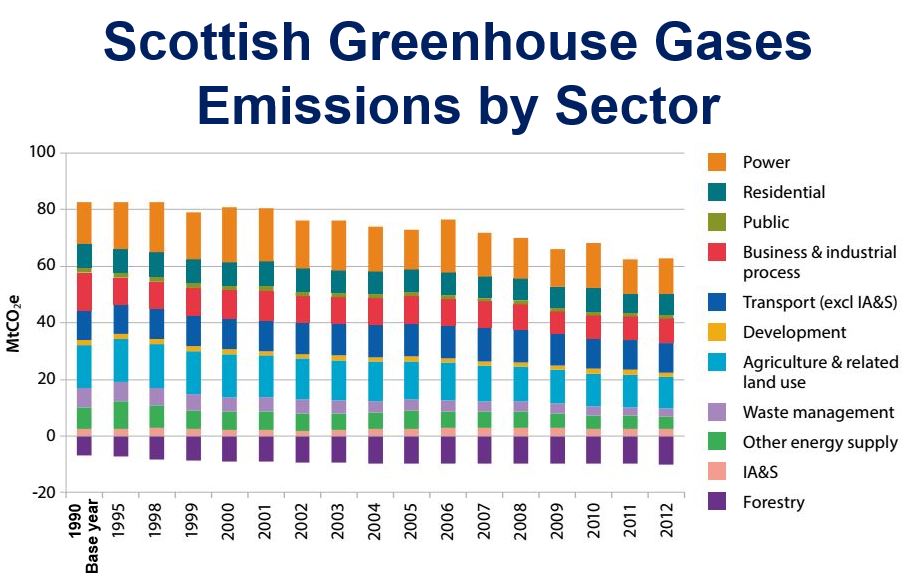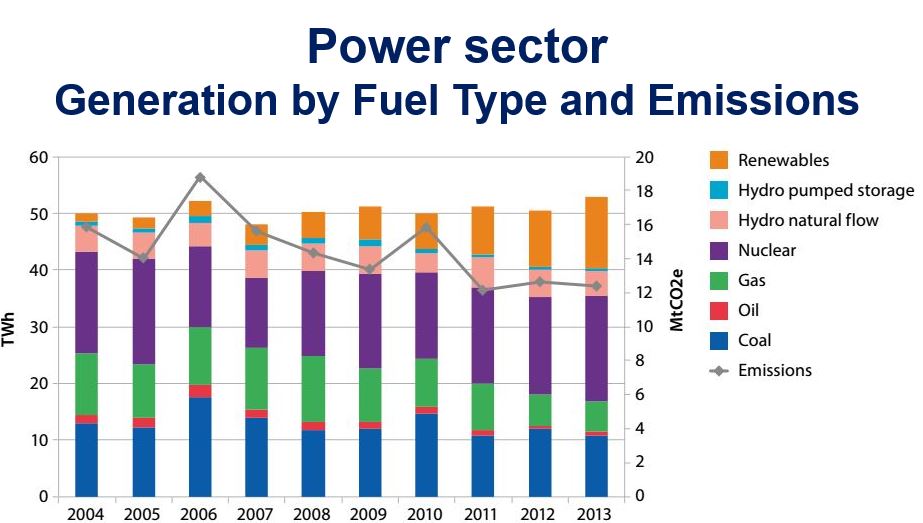While praising Scotland for making progress towards meeting greenhouse gas emission targets, congestion charges should be implemented by the Scottish government to secure its goals, the Committee on Climate Change (CCC) said in its fourth progress report published on Tuesday.
The authors said the Scottish Government will have to strengthen key policies if it is serious about meeting future targets.
Scotland, which is often leading the UK, has done well in implementing emission-reduction measures in several areas, the report informed.

Source: Committee on Climate Change
Scotland was praised for deploying renewable electricity generation capacity, which accounted for 44% of all electricity consumption in 2013.
It has also made good progress in installing community and locally-owned energy projects, where capacity has increased by 40% since 2012.
The CCC wrote in a statement:
“Scotland is on track to meet its 2020 energy consumption target early, with energy demand down almost 12% compared to a 2005-2007 baseline.”
Missed legislated target
However, in spite of these achievements, Scotland missed its legislated 2012 target of 53.226 MtCO2e by 4.5% (about 2.8 MtCO2e).
The latest improvements to how estimated emissions are calculated (Scottish greenhouse gas inventory) have had a significant impact, and without these changes Scotland would probably have met its 2012 target.
However, the CCC says progress to reduce emissions from agriculture and transport have been ‘limited’, with ‘carbon sinks’ (such as forests) also failing to meet government targets.

Source: Committee on Climate Change
Cycling: according to Scottish statistics, just 1% of journeys were done with a bicycle in 2013, the same percentage as in 2003. The 2020 target of 10% is clearly not going to happen.
Household waste: forty-two percent of household waste was being reused, recycled or composted in 2013, a 1% increase from 2012. “This shows that Scotland has missed the second Zero Waste Plan target for 2013 (50%); however 9 out of 32 of Scotland’s councils have met the 50% target,” the report informed.
Cars: new car efficiency continued in 2013, thanks to the EU directive targeting 95 gCO2/km by 2020. CO2 intensity of new private cars declined from 133.0 gCO2 in 2012 to 128.3 gCO2/km in 2013, which represented a reduction of 3.5%. This was in line with the United Kingdom, but higher than Northern Ireland and Wales.
Agriculture: emissions in agriculture have fallen by 0.87 MtCO2e, or 9%, since 2006. However, it is a difficult target to assess given the changes in the methodology used to measure emissions from agriculture since it was set.
Tree-planting: rates are far below those seen in the 1970s. Scotland till has a long way to go to meet its 10,000 hectare anual target. In 2012, about 7,000 hectares of new forest were planted, increasing to just over 8,000 in 2014. In order to meet its 100,000 hectare target for 2020, tree planting rates will need to increase considerably.
The CCC advises the Scottish Government to consider implementing additional measures, beyond its current policies.
The CCC proposes that a process and timeline be agreed with the Scottish Government to advise on the implications of improved inventory data that is expected later this year, and again in 2017.
Meeting future targets will not be easy, the report states, and will require additional measures in a number of sectors such as energy efficiency, transport, land use, agriculture, and low-carbon heat.
Even in areas where good progress has been made, challenges remain to reach the stretching targets the Scottish Government set out.
Chief Executive of the CCC, Matthew Bell, said:
“I have met with a large number of stakeholders in Scotland over recent months. Without exception they have commented positively on the ambition of the Scottish greenhouse gas reduction targets.” (Stakeholders are those who influence a project or business, as well as those who are affected by them).
“That ambition means they are difficult to meet but also places Scotland among the leaders in the world. The Scottish government and wider society will have to consider what additional measures to take over the coming years to continue to live up to that ambition.”
Regarding congestions charges, the Report stated:
“To encourage behaviour change, it may be necessary to explore other options such as congestion charging. Congestion charging has been successful in reducing the amount of vehicles on the roads in two UK cities (London and Durham).”
These latest findings are from the CCC’s 4th progress report to the Scottish government, as requested under the Climate Change (Scotland) Act (2009).
